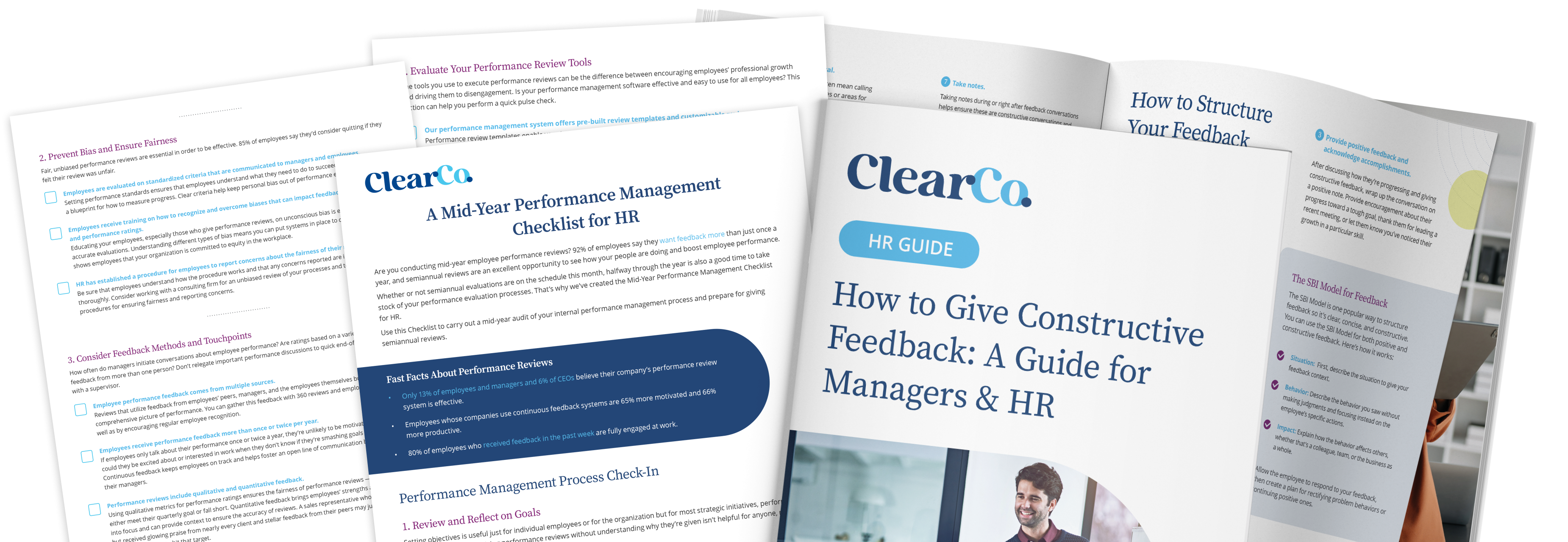This article on performance management strategies and best practices was originally published in December 2017. It was updated with new information in June 2025.
When you think about the effectiveness of your performance management process, are you part of the vast majority who would say it could be better? Just 2% of CHROs and one in five employees feel that their current strategies are fair, transparent, or motivate them to improve. That means the methods most companies use to manage performance are superficial, and they’re leaving untapped employee potential on the table.
If your performance reviews are annual affairs and regular feedback is unfamiliar territory, you’re missing out on the excellent results that are possible with a fresh approach. HR can make a powerful strategic move by supporting employees with people-first performance management.
The results speak for themselves. Organizational success is the outcome when companies focus on helping their people develop and improve:
- 4.2 times more likely to outperform their competitors
- 30% higher revenue growth
- 5% lower attrition rates, on average
Creating a successful performance management strategy that puts people first requires more than a few new structured processes. You need a company-wide commitment to transparency, communication, and growth.
Keep reading to learn more about the components of people-first performance management. We’ll get into why it’s important, how to balance accountability and development, and how to get employees involved in giving continuous feedback.
Start With a Strategic Framework
We know that there’s a solid performance management framework you can follow to build your strategy:
- Set Goals: Clear, specific, and challenging goals motivate employees and provide a roadmap for success. Goals aligned with deadlines and feedback drive better performance and productivity.
- Give Regular Feedback: Employees thrive on frequent, constructive feedback. It fosters engagement, builds confidence, and helps employees understand where they’re at and how to reach their goals.
- Conduct Regular Performance Reviews: Move beyond annual reviews to include quarterly, mid-year, or 360-degree reviews. These provide a holistic view of performance and ensure continuous improvement.
- Offer Learning and Development Opportunities: Prioritize professional growth to boost retention and engagement. L&D programs show employees they are valued and help retain high performers.
- Recognize Great Work: Acknowledging achievements improves engagement and motivation. Recognition programs — everything from public shout-outs to incentives and rewards — create a culture of appreciation and reinforce positive behaviors.
- Watch for Signs of Ineffective Performance Management: As you evaluate and continue refining your strategy, watch for red flags that can crop up later, like inconsistent performance appraisals, lack of feedback, or no goal tracking. Addressing these issues as they arise ensures your framework supports both employees and organizational goals.
Structure is not all it takes to create the best possible performance management strategy. It’s just as important to understand the nuances of an effective strategy and find the right software tools to execute and analyze your processes as it is to have this framework in place.
Why Is Performance Management Important for Employees?
It’s clear why companies need performance management strategies. They’re essential for ensuring employees are doing the work necessary to achieve business objectives. They keep teams on track and help prove business progress. But executives aren’t the only ones who care about performance management — employees do, too.
Without it, your workforce is at higher risk of becoming disengaged and ready to jump ship to the next opportunity that comes their way. According to Gallup research, an effective performance management strategy is the recipe for unmatched productivity and loyalty. It gives employees the tools they need to succeed:
1. Clear Expectations
Less than half of employees know what’s expected of them at work — so how can organizations expect peak productivity? If employees are in the dark about their responsibilities or how their work contributes to the organization, morale takes a hit, too. Effective performance management flips the script by ensuring expectations are clear, specific, and aligned with both individual roles and company objectives.
The most effective goal-setting strategy is collaborative, with managers and their team members working together to define what success looks like. Connecting individual goals to team and business goals provides even more clarity and motivation for employees.
2. Guidance As They Work Toward Goals
Setting goals is only the first step — consistent guidance and feedback are what enable employees to reach them. However, many companies fall short here, with 56% of employees only revisiting their goals with their manager once a year. In a work environment where priorities often change on a dime, that’s just not enough, creating confusion and frustration.
Frequent check-ins and real-time feedback help bridge this gap. Managers can spot areas for improvement early, provide encouragement, and align expectations as workloads and priorities evolve. They’re also a good opportunity to foster strengths and offer development and training. These ongoing conversations keep employees on track and foster a sense of support, while aiding their professional growth.
Don’t just say that employee success and growth are priorities — show it.
3. Fair, Transparent Performance Evaluations
Performance evaluations are a powerful tool, but not when just 22% of employees believe the process is equitable and clear. As one employee told Gallup, “Our rating system feels distant from the work being performed.”
When reviews are based on measurable criteria and tied to defined goals, employees gain confidence in the system. Removing ambiguity ensures that hard work and real outcomes, not subjective opinions, drive performance ratings.
Transparency is key here. Managers should be upfront about how performance is measured and what it takes to earn rewards and recognition. Providing detailed, data-backed insights during evaluations creates a culture of fairness and accountability, motivating employees to keep improving while building trust in leadership.
How To Balance Accountability & Employee Development in Performance Management
Accountability and development are both crucial to a performance management strategy, but you need to strike the right balance. Put too much focus on accountability, and you risk creating a harsh, high-pressure environment. Prioritize development while letting accountability fall to the wayside, and productivity might take a back seat. The sweet spot lies in a system that holds employees responsible for results while supporting their growth.
One strategy is to connect performance metrics directly to professional development. For example, when evaluating an employee’s goal progress and results, you can also look for growth opportunities tied to their role. Did they miss a target? Use it as a learning moment to identify skill gaps and suggest resources like mentorship or training.
Along the same lines, reward exceptional performance by offering new challenges or leadership opportunities. These actions reinforce accountability while encouraging continuous improvement and engagement.
Establish regular check-ins and provide ongoing feedback to maintain alignment with goals and expectations. Discuss both achievements and areas for growth, considering factors such as effort, available resources, and unforeseen obstacles. Adopting a growth-focused mindset allows managers to turn mistakes into valuable learning experiences.
Finally, prioritize clear, forward-looking communication. Regular conversations about goals, progress, and challenges ensure accountability doesn’t come as a surprise. When accountability is framed as a tool for empowerment, employees feel motivated to improve and excel in their roles.
How To Collect Employee Feedback On Management’s Performance
Great performance management ensures everyone is held accountable and given the chance to grow — including leadership throughout the company. Managers are instrumental in creating a positive, productive work environment, but without employee insights, it’s hard to know where they excel and where they fall short.
Start by creating avenues for anonymous feedback. Employees should be comfortable sharing their honest opinions without fear of retaliation. Employee surveys or feedback tools are excellent ways to invite open, constructive criticism. Be intentional, asking questions about areas like communication, support, and leadership effectiveness to uncover meaningful insights.
Beyond surveys, consider incorporating manager reviews into your regular feedback cycle. Employees can provide structured evaluations on their manager’s ability to lead, coach, and support their team. And don’t underestimate the value of informal feedback. Frequent one-on-one check-ins offer employees the chance to voice concerns or share compliments about their manager in a more personal setting.
Don’t stop there. Give employees multiple ways to provide input so you can capture a range of perspectives. For instance, create opportunities for team-based feedback. Sometimes, collaboration dynamics can reveal strengths and challenges that one-on-one evaluations don’t always capture.
Once feedback is collected, share actionable steps with managers to help them improve based on what you’ve learned. This could include training on emotional intelligence, communication skills, or leadership techniques. Transparency in how the feedback will be used is essential. If employees don’t see meaningful change, they may not bother giving feedback again.
That’s why the final step, acting on the feedback, might be the most important. When employees see that their input leads to real changes, it reinforces trust in leadership and the performance management system. This improves manager effectiveness and fosters a culture of collaboration and continuous improvement. It’s not just about gathering feedback but also showing employees you value their voices by making improvements that empower everyone.
It’s Time to Take Stock of Your Performance Strategies
As your organization grows and your workforce evolves, your performance management strategy will continue to evolve as well. But that’s only if you take the time to evaluate and refine it regularly — and mid-year is the perfect time for a performance management tune-up.
Take the time to give your strategy an honest review with the help of ClearCompany’s Mid-Year Performance Review Resources. Answer questions like:
- Do we need to invest in or upgrade our performance management software?
- Should we introduce quarterly performance reviews?
- How can we train managers on giving constructive feedback?
- How can we get useful feedback from our employees?
The time to unlock your team’s full potential is now. Will you take the next step?

.png)
